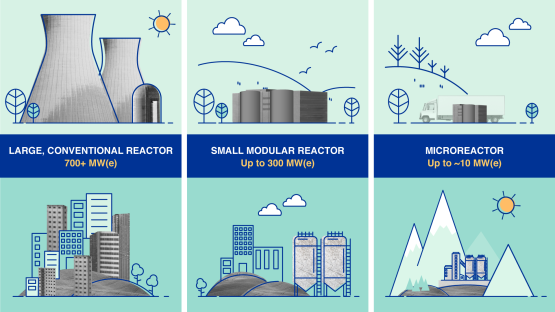At a time when the energy transition is a priority for Europe and the world, Greece is looking for sustainable solutions to wean itself off fossil fuels and achieve its zero-carbon goals. Small Modular Reactors (SMRs) are emerging as a technology that is attracting increasing interest internationally. But is it a suitable option for the Greek reality?
What are Small Modular Reactors (SMR)?
SMRs are smaller-scale nuclear reactors, typically ranging in power from 10 to 300 MW, as opposed to conventional reactors that can reach 1,000 MW or more. They are manufactured in factories as prefabricated units and can be transported and installed at their final destination, offering significant flexibility.
Their main features include:
- Smaller size and modular design, which allows the gradual addition of units depending on energy needs
- Lower initial investment cost compared to conventional nuclear power plants
- Advanced security features, often with passive systems that do not require human intervention in the event of an emergency
- Smaller footprint and infrastructure requirements
The energy situation in Greece today
Greece is in a critical phase of energy transformation. The National Energy and Climate Plan foresees a gradual delignitization and a shift towards renewable energy sources (RES). However, significant challenges remain:
- Fluctuation in RES energy production requires reliable solutions for grid stability
- Insularity creates challenges of interconnection and energy autonomy
- There is a need to replace lignite units with clean baseload sources
- Energy security is a growing concern in the international environment
Advantages of SMRs for the Greek reality
1. Complementarity with RES
SMRs could complement renewables, providing a stable power base when weather conditions are not conducive to wind and solar generation. This is particularly important as Greece increases the share of renewables in its energy mix.
2. Solution for remote areas and islands
The smaller size of SMRs makes them theoretically suitable for meeting energy needs in island areas that are not connected to the central grid or face adequacy problems, especially during the summer months due to tourism.
3. Reducing carbon emissions
Nuclear power produces minimal greenhouse gas emissions during operation, contributing to the country's decarbonization goals. Replacing gas and lignite-fired plants with SMRs could accelerate the achievement of climate goals.
4. Flexibility in development and cost
The phased installation of SMR units allows for phased investment and adaptation to changing energy needs, unlike large units that require huge one-time investments.
Challenges and concerns
Despite the potential benefits, the introduction of SMRs in Greece presents significant challenges that need to be carefully considered:
1. Economic viability
Although the initial cost is lower than conventional reactors, SMRs still require significant investment. The cost per kilowatt-hour produced remains uncertain, as the technology has not been widely deployed. In addition, the costs of decommissioning and waste management must be factored into the economic assessment.
2. Social acceptance
Nuclear power has traditionally faced public reservations, particularly after accidents such as Fukushima. In Greece, where there is no previous experience with nuclear power plants, there may be increased resistance to introducing the technology, even with the improved safety features of SMRs.
3. Seismicity and environmental risks
Greece is one of the most seismically active regions in Europe. Despite the advanced safety specifications of SMRs, seismic activity is a factor that must be carefully evaluated during design and site selection.
4. Regulatory framework and know-how
The country lacks a comprehensive regulatory framework for nuclear energy, nor sufficient experience in supervising such facilities. Developing the necessary regulations and training specialized personnel requires time and resources.
5. Nuclear waste management
Although SMRs produce smaller amounts of waste, the management of radioactive materials remains a challenge that requires long-term planning and safe storage facilities.
International experience and developments
Globally, several countries are moving forward with the development and installation of SMRs:
- Russia already has operational floating SMRs
- The US and Canada are investing in research and development of new SMR technologies
- UK considers SMRs as part of decarbonisation strategy
- Countries such as Poland and the Czech Republic are also exploring SMR technology.
It is worth noting that at the European level there is growing interest in SMRs, with the European Commission including them in the discussion on the energy transition, especially after classifying nuclear energy as a "green" investment under certain conditions.
Alternative options for Greece
Before proceeding with the adoption of SMRs, Greece should carefully consider the alternative options:
- Further expansion of RES with storage systems: Investment in large-scale energy storage systems (batteries, pumped storage, green hydrogen) could solve the problem of RES variability.
- Connections: The completion of interconnections between the mainland and islands, as well as with neighboring countries, would enhance the stability of the network.
- Natural gas units as a transitional solution: Despite its carbon footprint, natural gas offers lower emissions than lignite and greater flexibility.
Conclusions
Small Modular Reactors could theoretically be part of Greece's energy mix, offering stable, low-carbon generation and complementing renewables. However, significant challenges remain:
- The financial cost and uncertainty of investments
- The lack of experience and regulatory framework
- Social acceptance and environmental concerns
- The geological peculiarities of the country
Making a decision to introduce SMRs in Greece requires thorough study, public debate and consideration of all alternatives. It is important to evaluate not only the technical and economic characteristics, but also the long-term impacts on the environment, society and the economy.
In any case, Greece’s energy transition must be based on a diversified mix of technologies, with priority given to renewables and energy efficiency. SMRs could be part of this mix, but not a panacea for all the country’s energy challenges.



